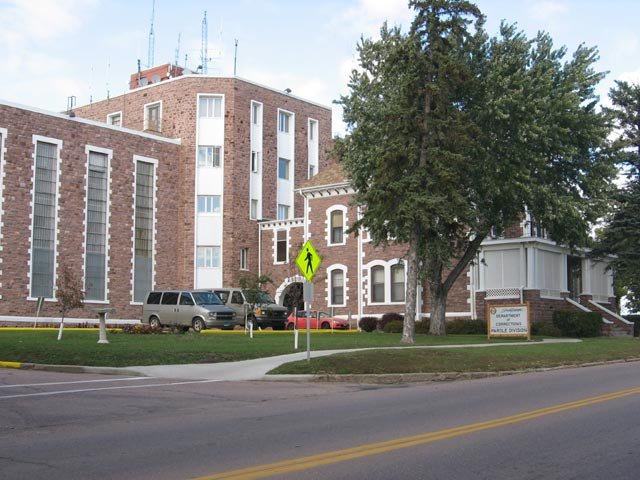A couple of weeks ago there were commutation and parole hearings here at the penitentiary in Sioux Falls, South Dakota. I am not giving names or case incidents. What I will say is that, as always, the amount of news that some of these received in the local media was intense. And the hype and fear that followed - well, it was way over the top.
A whole lot of people were and are convinced that if an inmate goes up for a commutation hearing - and receives it - they get released back into the community that day. WRONG.
Commutation is not a pardon, nor compassionate release. It actually has nothing to do with actually getting OUT. It's a process. Before there's even a hearing, there are interviews, a complete review of the case files, more interviews. If everything goes well, a recommendation is made to the Parole Board to hear it. They don't have to.
If the Parole Board agrees to hear the case, then there is a hearing with the inmate that is open to the public (friends and family on both sides, media, supporters, politicians, etc.). The hearings can be brutal. I've sat through a couple of them along the line. Lot of unfettered emotion. DAs and SAs and sheriffs relitigating the case, despite being told that they're not there to relitigate the case.
At the end of the hearing, with the inmate and public sitting there, the board votes. If the majority votes against approval, the inmate goes back to his/her cell. If they want, they can reapply next year. Some do – year after year after year. Some bag the whole idea and never apply again.
If the majority approves commutation, then the inmate still goes back to his/her cell.
Because the next step isn't release: it's determining what the sentence should be. A commutation is not a pardon. A commutation means that the Parole Board has decided that the sentence (usually life without parole) can and should be reduced to a number of years, and they get to decide how long. I've heard figures like 100, 200, 300 years bandied about. So what a commutation gives you is not an instant get out of prison free card, but a new sentence which makes it possible, sometime in the future, that you can apply for parole. And you can always get turned down for parole, too, even after a commutation.
But before that, the governor has to sign off on the commutation.
So a recommendation packet is made up, with all case files, documentation, the recommended new sentence, etc. And it gets sent to the governor's desk where... It's up to the governor.
Because the governor can sign the paperwork whenever the governor damn well wants to. As one Parole Board member said, governors have been known to sign the paperwork within days or weeks or months, or years. Or never.
And, of course, the governor can reject the Board's recommendation entirely and refuse to sign off on it. In which case, the inmate can apply again the next year, though I would advise waiting for a new governor.
But if the governor signs off, then the inmate has to continue to serve until they're finally eligible for a parole hearing - and the whole process starts up again.
So, even with a commutation, it can easily take years for an inmate to be released.
This is the way the law works. It's slow. It's messy. It's rarely swift. It's an exhausting process.
But it beats a world without it.

Informative as always.
ReplyDeleteThanks, Janice!
ReplyDeleteGood job Eve. I am so glad you wrote this blog so people can understand the process of commutation. Well done as usual.
ReplyDeleteI intend to circulate this to all and sundry. By the by, I am tired to my bones trying to make this fercockt system allow me to publish as other than Anonymous. I am Jerry K. Sweeny, and I approve this message with three gold stars and bowl of buttered popcorn. So there!
ReplyDeleteJerry, I apologize. We suffer random problems with the commenting mechanism. Recently it banned me for several days, so blogger doesn't discriminate.
DeleteThanks, Allan. And thanks, Jerry - welcome aboard!
ReplyDeleteI'm with Allan and Anon– things I did not know. I've repeatedly heard the deck is stacked against the inmate, that parole board political appointees are timid about releasing the incarcerated. Interesting to get an inside look.
ReplyDeleteRecently questions about the Mason girls arose. Starting with old news…
• Background: Susan Atkins was denied compassionate release. Gov Newsom deemed her a threat despite having a leg amputated, being bed-bound, and dying of brain cancer.
• The state parole board recommended releasing Leslie Van Houten, 73, but again the governor said she was not only a threat to society but had failed to address her culpability.
• The state parole board in May recommended release of Patricia Krenwinkel, 74, although the governor has turned down that request many times, for a total of 14 denials.
Unlike the governor, I believe people can change, but it’s hard to prove if never given a chance.
Thanks for explaining how that works, Eve.
A lot of parole board appointees are former judges, sheriffs, and prosecutors. And governors are always leery of releasing anyone who might be "dangerous". Up here in SD, it's common knowledge that Leonard Peltier will never be released.
ReplyDelete